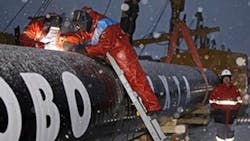Russia Taps Super-Giant Gas Field after 40-Year Wait
Russia's Gazprom (IW 1000/16) state energy giant on Tuesday launched production at one of the world's largest natural gas fields some 40 years after its discovery by Soviet scientists in the frozen and hitherto inaccessible Arctic.
President Vladimir Putin formally pushed the button on the start of commercial energy production at the Arctic deposit whose discovery in the early 1970s created excitement and frustration in equal measure.
The Bovanenkovo field on the Yamal peninsula at the extreme of northwestern Siberia has what Gazprom estimates is 177 trillion cubic feet of natural gas -- a figure making it one of the world's three largest.
But it also lies amid permafrost and had remained cut off from access to pipelines or even basic communication until recent years.
"The field will produce 115 billion cubic meters [4,060 billion cubic feet] of gas and that will go up to nearly 140 billion," Putin told the field's workers by live video link-up from Moscow.
"This is nearly the equivalent of how much we export to Europe," he stressed.
The super-giant field -- second in size in Russia only to Gazprom's vital Urengoi deposit to the south -- is part of an Arctic project that Gazprom has been pinning its hopes on in the post-Soviet era as its older wells run dry.
Russia's largest company saw its exports to Europe slip last year after remaining flat for years amid lagging production and demand that is sagging on account of the global financial crisis.
Gazprom had decided on a risk-wrought strategy of ignoring fresh field development while purchasing gas from other countries as it waited for Bovanenkovo to go online.
Gazprom chief executive Alexei Miller said Gazprom intended to launch nearly 150 wells this year that feed into pipelines to Europe and replace supplies lost from the currently on-hold Shtokman field project in the Barents Sea.
"We intend to create on oil and gas province (in Yamal)," Putin added in the live link-up. "We will launch dozens of new promising fields," he said.
Russia provides about 30% of Europe's natural gas imports and is the world's largest exporter of energy -- a dominant status that has seen EU nations seek import diversification and reforms aimed at breaking up Gazprom's foreign holdings.
Copyright Agence France-Presse, 2012
About the Author
Agence France-Presse
Copyright Agence France-Presse, 2002-2025. AFP text, photos, graphics and logos shall not be reproduced, published, broadcast, rewritten for broadcast or publication or redistributed directly or indirectly in any medium. AFP shall not be held liable for any delays, inaccuracies, errors or omissions in any AFP content, or for any actions taken in consequence.
